
On Tuesday, October 1, 2019, The Light Millennium, along with the Consulate General of India in New York, Shanti Fund, and Anuvrat (Anuvibha) Global Organization, led and hosted a program in reflection of Mahatma Gandhi’s 150th birthday and on the occasion of the International Day of Non-Violence on October 2.
At the Salvation Army International Social Justice Commission, individuals of various backgrounds came together to celebrate the work of Gandhi and to speak of the man’s methods of non-violence and how it can relate to today’s world.
Reported by: NaYoung YANG, Vilacesti Inc.
Run-Down | Photo Album of the Event |
PROGRAMME – Booklet of the Event
Opening Session – Moderated by Bircan Ünver, The Light Millennium
The event was structured in two main sections, starting with an Opening Session followed by the Multi-Participatory Session.
Before the event started, participants were encouraged to have a vegetarian lunch and to take time to observe the photo exhibit set up on stage. The photo exhibit titled, “Gandhi with the World Leaders” consisted with 15 photos, in each, Gandhi depicted with many world leaders of his time and renowned personnels in various areas. There were also photographs of the man’s community service efforts, helping the poor and giving speeches around the country. A statue of Gandhi was also provided and set up on stage by the podium where the speakers would later stand.
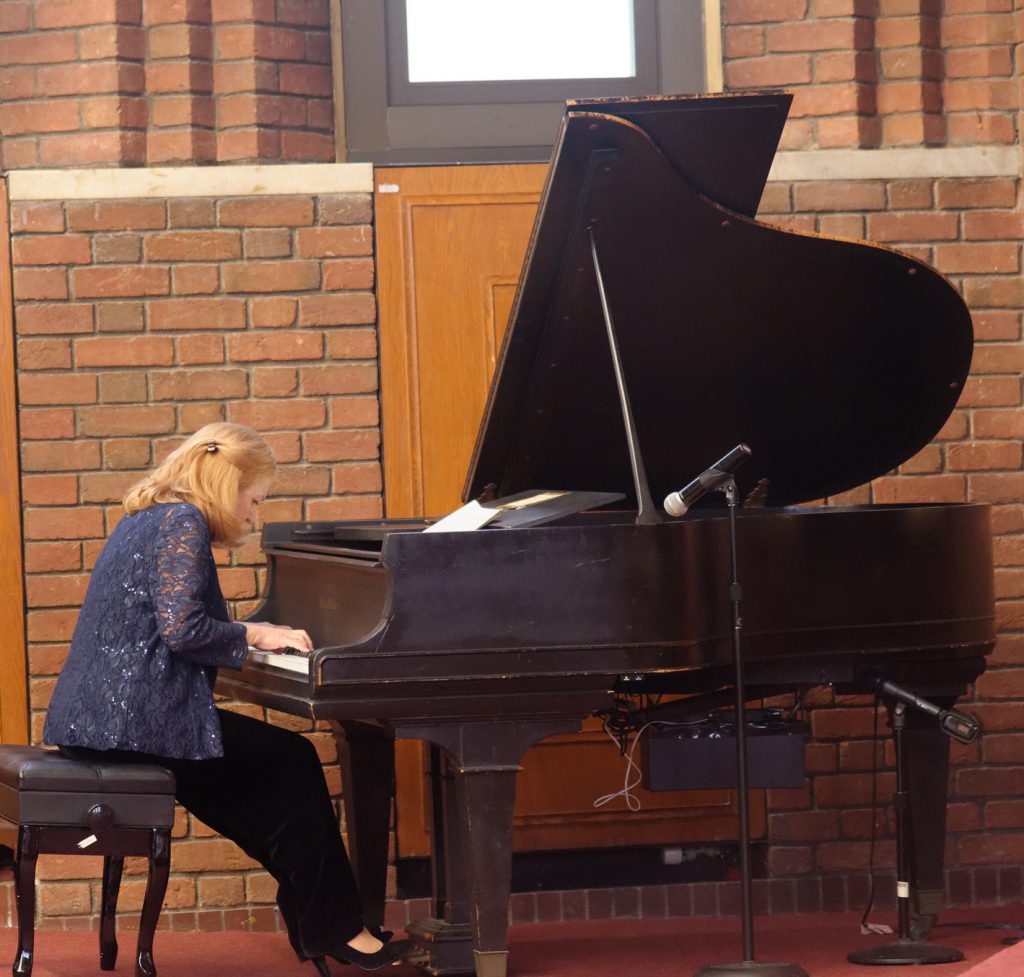
The session officially started with a performance by pianist Tiraje Guneyman Ruckman (Columbus, Ohio), who played a set of selected short pieces by Chopin. A welcoming remark was delivered by Bircan Ünver, the Founder, President, and TV Producer of The Light Millennium, and was followed by the Opening Remarks by the Deputy Counsul General of India in New York Hon. Mr. Shatrughna Sinha.
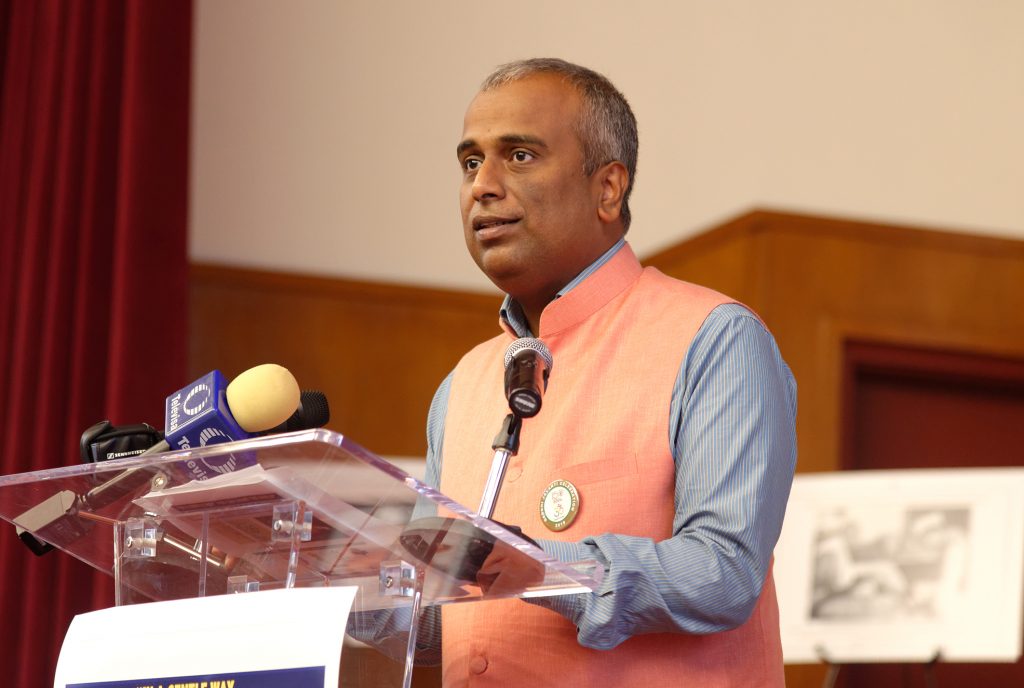
Hon. Mr. Sinha spoke of the need for nonviolence, and how Gandhi was able to achieve this during his time, pointing to the photo exhibit surrounding the stage. He then continued to cite the names and methods of those exercising non-violent measures to bring about change today, such as Senator John Lewis.
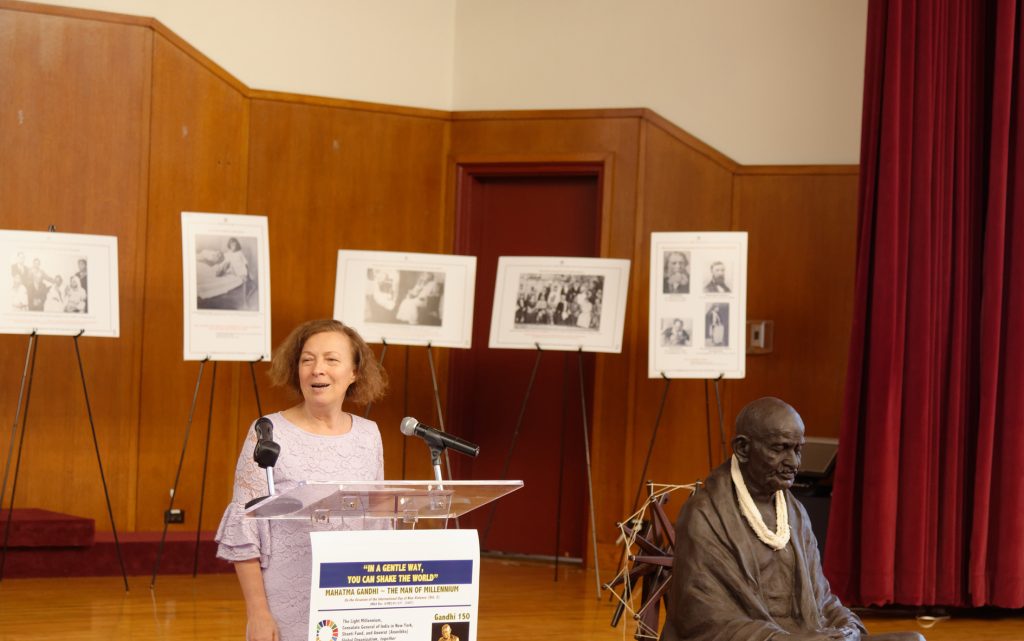
Ms. Ünver set the tone for the rest of the program as she shared the theme of the program through her personal wishes over the decades to see changes in her country and in the world in nonviolent ways, just as she saw Gandhi achieve it in India. In her remarks, she referred the movie Gandhi (1982) that was her very first encounter and understanding the concept of “non-violence”. With that effect, she mentioned that in recent years, the produced LMTV programs in connection with the “non-violence”, “peace” and Gandhi” and the concept of the event on Gandhi was as her dream come true.
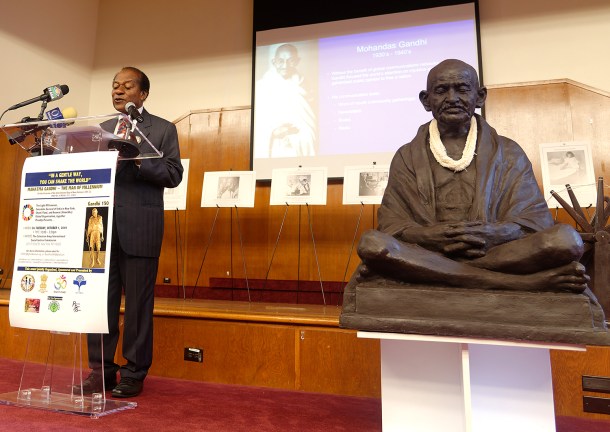
She then handed the stage over to the event’s keynote speaker: Prof Victor B. Lawrence, Professor at Stevens Institute of Technology and 2016 National Inventors Hall of Fame Inductee for having invented signaling in telecommunication and improving the Internet and high-speed connections. In his keynote address, Professor Lawrence spoke of “how Information and Communication Technologies (ICT) can contribute to non-violence and peace“, tracing the works of Gandhi, Martin Luther King Jr., and Nelson Mandela to modern activists such as Greta Thurnberg.
Prof. Lawrence explained the impact of technological growth on the spread of information and advocacy that gave power of speech to those who cannot express themselves by more conventional means. Social media has allowed the concept of viral media to rise, leading to widespread events such as the Women’s Marches, Arab Spring, and till recently, peaceful protests in Hong Kong. The concept of live streaming through social media also allowed the Democrats to live stream their sit-in in Congress when the live cable was switched off. As information and communication spread from utilizing simple word of mouth to the Internet, access to information was able to be grasped not by just strong corporations and individuals, but by the general public as well.
“Are technologies causing the many issues that we are seeing today?“

While he praised the progress of ICT over the years, noting major milestones throughout history, Prof. Lawrence took the time to acknowledge the bad that social media and modern technology can allow: low mental health on social media leading to depression in younger generation (and suicide), terrorists recruiting and communicating, loss of privacy, cyberbulling, hate speech, and compromisation of fundamental institution of democracies. But taking a twist on the theme of the day and Gandhi’s quote ‘‘In a Gentle Way, You can Shake the World,’ Prof. Lawrence stated that ‘Through emerging ICT technologies, you can shake the world in a different way — more effectively, securely, peacefully.’ Despite the risks and downfall of technology advancement, current developments in AI, machine learning, and blockchain can comb through large amounts of data to predict future behaviour and curate information for individuals, identify and bring awareness of corruption, track progress in global goals such as Sustainable Development Goals, and safeguard information while allowing for data verification.
In the end, linking the potential of technology and the downfalls people cite to antagonize it, Prof. Lawrence posed the question: are technologies causing the many issues that we are seeing today?
His answer was the following: “There is nothing wrong with Science and Technology. What is flawed in the world is human nature: Man has increased his knowledge and power over his environment but not over himself. That is why we live in a time of crisis. Whatever has been invented cannot be un-invented. So what should we do? We should continue the innovation of technologies that detect and prevent misuse of technologies, advocate for and develop policies on how to use these tools correctly for the greater good, and we, the humans, must learn to make the best use of it for this world.”
Other speakers also followed up on Prof. Lawrence’s speech through emphasizing other ways in which Gandhi’s teachings and methods to achieve peace is relevant today. Dr. Abdelkadar Abbadi, former Director of Political Affairs in the Department of the Security Council at the UN, reiterated Prof. Lawrence in how the 21st century brought incredible changes in technology and how these developments have impacted the peacemaking process today.

As countries measure their strength in technological prowess, Dr. Abbadi emphasized the immense need for love of one’s fellow man — the power of love should overrule the love of power. By remembering this lesson, we could apply its teachings to many areas in the modern world, including post-conflict reconciliation. Gandhi’s Notion of Peace

In the Opening Session of the event, H.E. Mr. Rodrigo A. Carazo Ambassador, Permanent Representative of Costa Rica to the United Nations, delivered a Brief Remarks. While speaking of Gandhi’s message of change through non-violence, he mourned the fact that many in “today’s world chooses a different path.” He noted the irony of modern countries supporting the idea that if one wants peace, one must prepare for war — to him, a form of ‘self destruction.’ The chief sign that war has gone on long enough and it was time for armies to be demolished was when he noted that at the end of a long war, the victors and vanquished didn’t care which side came out victorious, but all just wanted to go home. Using his country of Costa Rica as an example, he showed how countries can survive after abolishing their armies through depending on diplomatic organizations and methods in resolving conflict. With their success in living for 70 years as a nation with no military, Ambassador Carazo noted how in fact, it was Costa Rica that proposed to the UN to create a University of Peace based on the teachings of Gandhi and helped establish it in 1980.

The most notable of the benefits that could come with a nation exercising non-violence and demilitarization was shown through Costa Rica’s use of resources. As spoken by Ambassador Carazo, “While countries keep their hands in military budgets, Costa Rica has gone 70 years without an army, living in peace and relying on international agreements as it’s only means of defense, while dedicating large amounts of public resources not to prepare for war, but to enhance minds through an ever increasing public education program, to protect bodies by means of universal health care system, and to protect and to strive to assure an ecologically balanced environment. That’s where the funds go to in Costa Rica.” This comparison of budgeting of public resources brought everyone to a pause towards what those living in militarized countries are losing in benefiting the minds and bodies of its civilians.
With Costa Rica as a proof and a source of inspiration, he went on with the hope that more countries will follow suit and demilitarize, bringing peace and non-violence throughout the world, continuing the teachings of Gandhi not only on the Man’s birthday, but through developing a serious and pragmatic plan of action to promote nonviolence.

Mr. Syed K. Omar Hassan, Assistant Director of the Office of the Mayor on Management and Budget, promoted mercy and tolerance regardless of race or religion. While countries use their military strength as a measure of power, Mr. Hassan went against this notion. Rather, he said, “It is power when it extends a hand to mankind.” He explained how ‘Stage of Love’ exemplifies this through showing a hand and using words to resolve conflict. In the end, he cited education as the key to increasing tolerance and awareness.
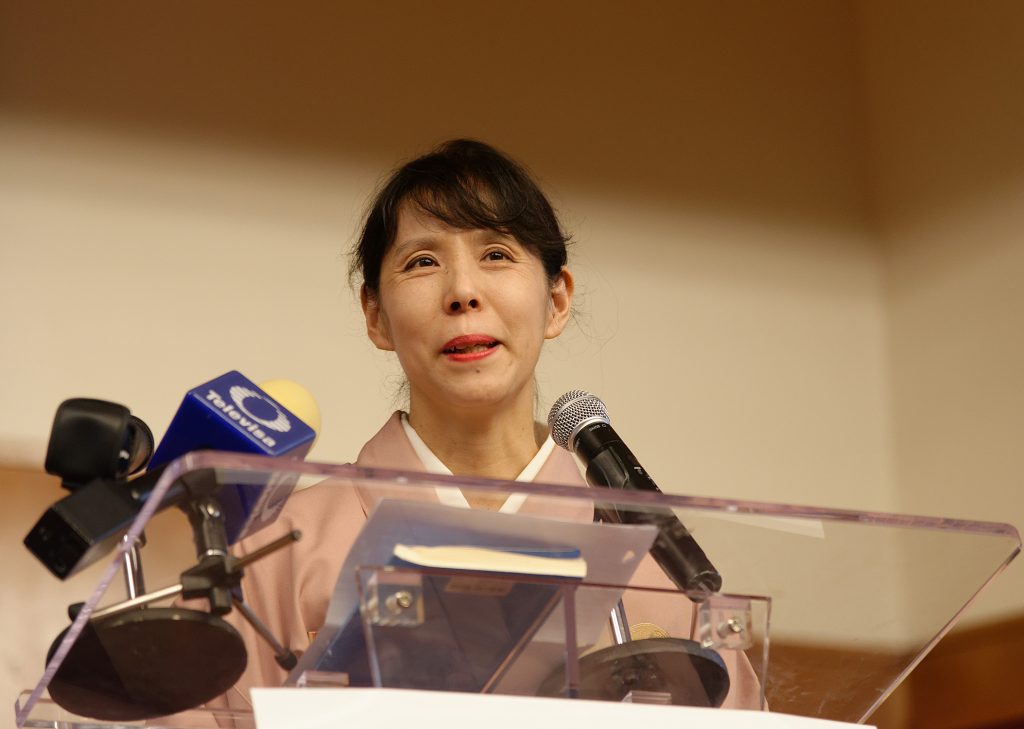
Mrs. Chikako Hoshino used the art of yoga to speak about ways to open the mind and spirit as not only a calming method, but also as an active exercise in promoting tolerance and acceptance. After Mrs. Hoshino, the first half of the event, its Opening Session ended with a seashell performance by the World Yoga Community that would traditionally be used to celebrate victories and large events.

Multi-Participatory Session – Moderated by Bakul Matalia, Shanti Fund

After the performance, Mr. Bakul Matalia, a volunteer representing the Shanti Fund, moderated the Multi-Participatory Session. He set the tone by explaining the background of the Shanti Fund which promotes non-violence through Gandhian values, and laying a personal touch as he mentioned how his wife’s parents were married by Gandhi many years ago.

Before the speakers of the multi-participatory session came onto the stage, a short clip from ‘From India with Love’ was shown. Unfortunately, the director, Mandar Apte, was unable to attend. However, he sent in a video to be played before and after the clip, expressing his thoughts and wishes in relation to the theme of non-violence. In the end, he expressed his wish “to stimulate you [the audience] to have your own experience when dealing with violence and being a messenger of peace… Nonviolence is not a road, it’s a journey. The conversations in this film we hope will inspire you to walk on that journey.”

This video was followed by Dr. Panna Shah, Representative of Anuvrat Global Organization to the UN Department of Global Communications. Dr. Shah talked of the concept of ‘anuvibha,’ meaning ‘non-violence.’ She made an important point of how mental violence, while unseen, should be treated and regarded as equal or even greater than physical violence, thereby giving a tribute to recent advocacy and awareness efforts taking place around mental health. In the end, Dr. Shah noted that in order to create global peace, we must practice inner peace first within ourselves.

Dr. James F. Leckman from the Yale School of Medicine and the Child Study Center brought a scientific twist to the event’s theme. Citing scientific evidence of the long-term impacts of early childhood education, he emphasised how vital the environment of a growing child, from development in the womb to early adulthood, can be. ‘To have a more peaceful world, we need to raise our children differently,’ he said. We need to teach them peace and importance of equality early on by example and lessons in school and at home. By raising our children in ways that would teach them tolerance and non-violence, we could influence the future world.

Mrs. Aishwarya Narasimhadevara, Youth Representative of Medical Women’s International Association to the UN Department of Global Communications spoke of her experience in NGO advocacy and the tactics used in awareness campaigns. These exercises mirrored greatly Gandhi’s non-violent methods that emphasized equality for all.

Mr. Sailesh Singhal, Founder of Youth of India, used the famous fable of the elephant and the ant to speak of the strength that lies in every individual, regardless of how powerful or powerless they may seem at first glance. By respecting every person’s strengths to bolster each others’ weaknesses, we could build a society that allows every individual to play a part.

The last three speakers reiterated themes mentioned before, adding their own interpretations and methods to achieve these wishes of non-violence. Mr. HK Shah of Ahimsa (Nonviolence) and World Vegan Vision talked of dietary restrictions and how it is a first step to non violence towards all living things, not just humans.
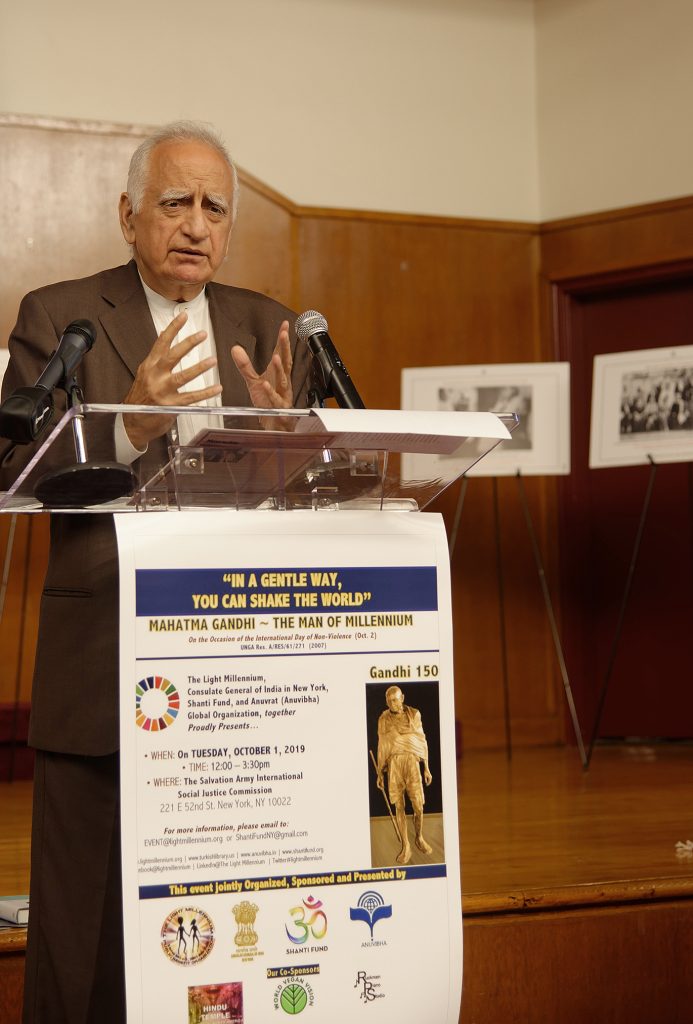
Dr. Farque Khan of the Islamic Center of Westbury spoke again of the importance and relevance of Gandhian methods of non-violence today during an era of military power.
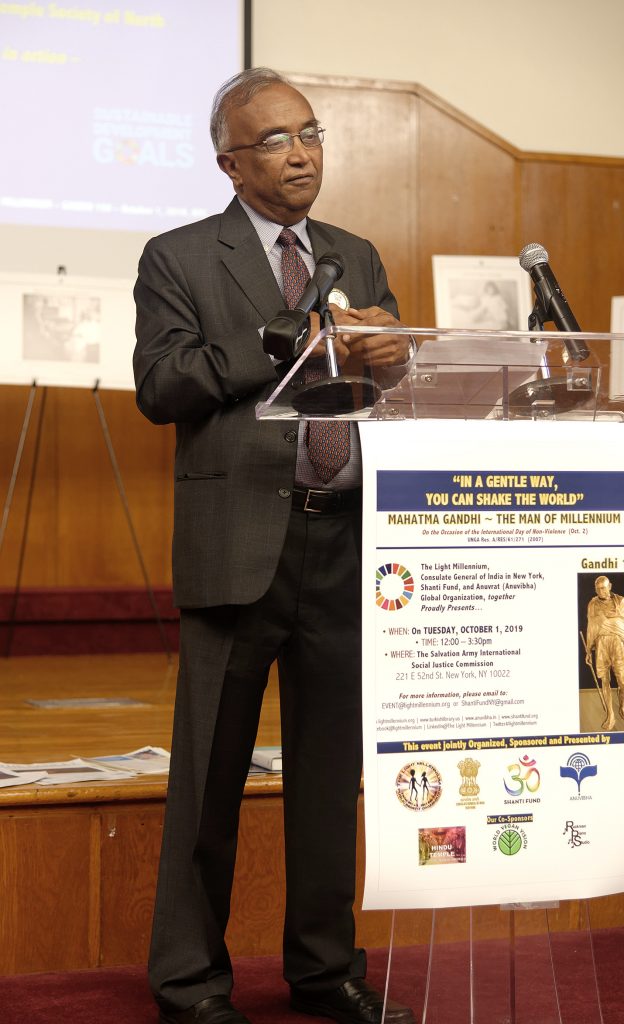
Mr. Ramaswami Mohan of Hindu Temple Society of North America linked Hindu Dharma to the Gandhian Way, preaching tolerance for all religions as we are all children of God. He ended with a memorable lesson for all the remember: “Nonviolence is not cowardice. It’s actually a show of strength and will.”

After closing remarks by Arvind Vora, a representative of the Anuvrat Global Organization to the UN, the session was brought to a close by musical performances where Singer Yoomesh Sharme sang ‘Vaishanav Jan to Tenere Kahiye’ or ‘Devotee of Vishnu.’ Before singing, she mentioned how the song relayed Gandhian themes on how to become a good human being.
Mrs. Tiraje Guneyman Ruckman again came to the stage, bookending the session with another selection of Chopin’s pieces to end the afternoon.

As for the appreciation, the book “Gandhi Going Global” and an “Autobiography of Gandhi” presented to the esteem speakers of the event, which has marked the 150th Birth Anniversary of Mahatma Gandhi.
The event received over 130 guests from various cultural and religious background along with representatives from the United Nations and UN affiliated NGOs including Mr. Davide Soutilha, Adviser, Permanent Mission of Portugal to the United Nations; Mr. Vahd Nabyl A. Mulachela, Senior Advisor, Office of the President of the UNGA 74th Session; Dr. Padmini Murphy, Vice President, NGO DPI Executive Committee; Dr. Bobbi Nassar, NGO Committee on Human Rights; Rev. JoAnn Barrett, Gathering of Light Church; Jajesh Jain, Interfaith Activist, Author, Business Coach; Young Min Shin, US East Coast Director, Heavenly Culture, World Peace (HWPL); Dr. Yousufuddin Syed, Chairman, Global Interfaith Peace Mission; Dr. Bhadra Shah, Vice Chairwoman, Parliament of World Religions; Mr. Sevgin Oktay, President, Turkish Anti-Defamation Alliance (TADA); Mr. Vihaji Patel (Butala) Author, “Gandhi Going Global”, several NGO representatives from the Brahma Kumaris were among the attendees.
The Core-Organizers of the ‘In a Gentle Way, You can Shake the World’ Mahatma Gandhi ~ The Man of Millennium, event are: The Light Millennium, Consulate General of India in New York, Shanti Fund, and Anuvrat (Anuvibha) Global Organization
Run-Down
Photo Album of the Event | PROGRAMME – Booklet of the Event

PROGRAM (as it is presented.)
